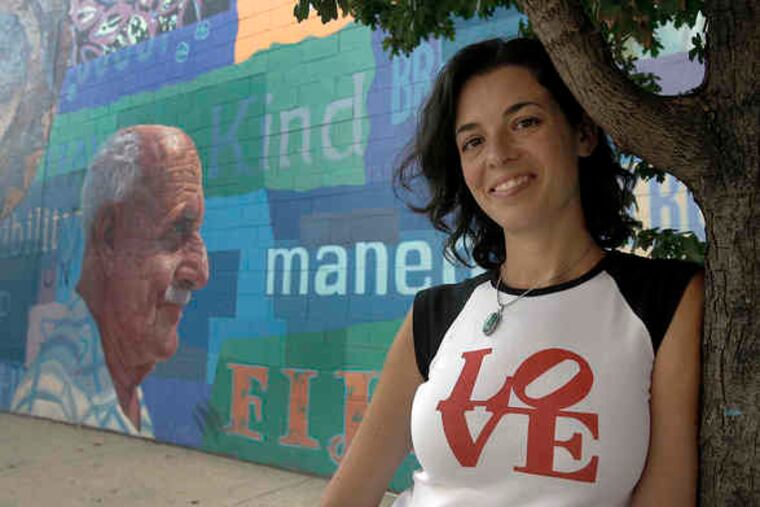Karen Heller: Philadelphia playwright relies on neighborhood for inspiration
"Q is for quemar, to burn a house to the ground beneath, making a block full of row homes like a smile that's missing its two front teeth."

"Q is for quemar, to burn a house to the ground beneath, making a block full of row homes like a smile that's missing its two front teeth."
Q is also for Quiara Alegría Hudes, author of Welcome to My Neighborhood!, possibly the only children's book celebrating the urban splendor of her former neighborhoods of North and West Philadelphia, as well as Chinatown.
The book, also published in Spanish, features illustrations by Shino Arihara and was edited by Arthur A. Levine, the man prescient enough to sign J.K. Rowling.
Welcome rejoices in the unvarnished splendor of the everyday. "B is for bottles that are smashed like falling stars. Broken bottles of black cherry soda bought at barrio bodegas." Or "E is for the echo of the elevated train. Or "P is for Porky's Point, my papi's favorite roast pig joint," at Fifth and Rising Sun.
"I'm kind of a landscape writer," said Hudes, 33, a two-time Pulitzer finalist for playwriting, and author of the Tony Award-winning musical In the Heights. "These places have a way of finding their way into my writing."
This book, and her plays, feature a mosaic of communities. Elliot, A Soldier's Fugue - the first in a trilogy inspired by her cousin and uncle, veterans both - includes North Philadelphia, Puerto Rico, Vietnam, and Iraq.
Hudes, the daughter of a Puerto Rican mother and a Polish Jewish father, grew up near 49th and Baltimore, an area she recalls fondly as an intoxicating pan-cultural stew. Her mother's family has significant roots around Second and Girard, where Hudes sat Saturday heralding its influence on her work.
"We're a big family, and it's a small community," said Hudes, who lives in Manhattan with her husband and 3-year-old daughter. Her mother and stepfather, Virginia and Sedo Sánchez, are community leaders.
"She is a true product of Philadelphia, and everything she writes is rooted in the city," says her step-aunt, Councilwoman Maria Quiñones-Sánchez. "Her family were trailblazers in so many ways - artistic, business, political - and encouraged her to do whatever she wanted to do."
Aunt Eugenia "Ginny" Burgos, a Norris Square activist and gardener who died in 2009 and whose family serves as the source of the Elliot trilogy, inspired Welcome's "V is for the vegetable plot that used to be a vacant lot."
Hudes, with a B.A. in music composition from Yale and an M.F.A. in playwriting from Brown, is arguably the most successful young playwright documenting Philadelphia, but little of her work has been staged for sizable audiences in her hometown.
Elliot received rhapsodic reviews in Manhattan ("a theater work that succeeds on every level, while creating something new," the New York Times gushed in 2006) yet played here only this year at the Walnut Street Theatre's tiny 80-seat Independence Studio.
The trilogy's second play, Water by the Spoonful, was commissioned by the Hartford Stage. The third, the still-untitled "jibaro play" inspired by Puerto Rican hill music (the J in her barrio ABC), is being produced by Chicago's Goodman Theatre. Set to open next year, the piece will cover the death of Philadelphia musician and activist Joaquin Rivera, a dear family friend, who died in November 2009 waiting to see a physician in Aria Health-Frankford Campus' emergency room, his watch subsequently pilfered by three thugs.
"I'm inspired by the August Wilson play cycle," Hudes said. "His relationship with Pittsburgh is what I aspire to do with Philadelphia, though my writing style is quite different, and would that I could be half the writer that he was."
In a punishing business, few playwrights ever make a living; Hudes is too busy. In the Heights still plays on Broadway. She was commissioned to write the theatrical book based on Laura Esquivel's Water for Chocolate, with music by Mexican American performer Lila Downs, scheduled for Broadway next year.
She's writing the telenovela Pedro & Maria for MTV, "a Romeo and Juliet love story of two high school students, an upper-crust Puerto Rican girl and a just-off-the-boat Dominican."
Hudes' career was not always this blessed. "Being a writer is like being an entrepreneur," she said. "You're taking the same sort of risks while investing all your work in your writing. You don't know if it will pay off." Not so long ago, she was temping and living off credit cards. Her husband, now a legal-aid lawyer, was finishing law school. Her daughter was born after an In the Heights preview before anyone knew it would be a hit. Hudes still rents.
The second play addresses "my aunt's passing, cocaine addiction. My family is not immune to the wonderful spoils of North Philadelphia." Second and Berks is central to that play, and the third, as are other neighborhood haunts like Riehs Flowers.
"It broke my heart that Elliot, which I think is my best work, could only find a home in a tiny theater," Hudes said. "These are exactly the type of productions we need to support in a powerful way," Quiñones-Sánchez said.
For now, the road company of In the Heights, set in New York's Washington Heights Latino community, arrives at the Academy of Music in January for eight performances. "The Academy of Music?" Hudes said, delighted. "That's where I had my graduation from Central High."
Only 15 years ago.